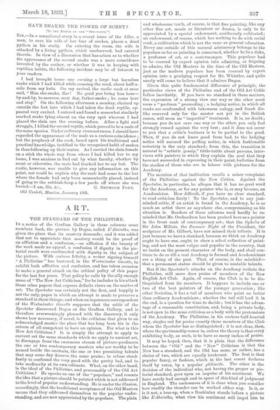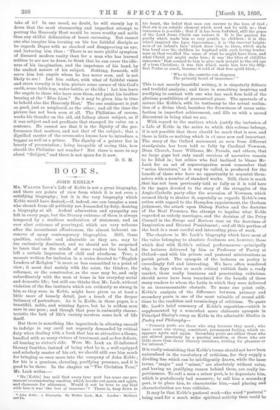ART.
THE STANDARD OF THE PHILISTINE.
IN a notice of the Grafton Gallery in these columns some numbers back, the picture by Degas, called L' Absinthe, was given the place that its mastery demands ; and it was added that not to appreciate that mastery would be the proof of an affliction and a confusion,—an affliction if the beauty of the work made no appeal, a confusion if dignity in the pic- torial result were confounded with dignity in the subject of the picture. With curious felicity, a writer signing himself "A Philistine" has hastened, in the Westminster Gazette, to exhibit both affliction and confusion, and has taken occasion to make a general attack on the critical policy of this paper for the last few years. That policy he calls by the silly enough name of "The New Art Criticism," for he includes in his attack those other papers that express definite views on the matter of art. The Spectator was certainly not the first, and happily is not the only, paper in which an attempt is made to preserve a standard in these things; and when an ingenuous correspondent of the Westminster Gazette supposes that the critic of the Spectator discovered Degas at the Grafton Gallery, and is therefore overweeningly pleased with the discovery, it only shows how necessary, if novel, is the criticism that gives to an acknowledged master the place that has long been his in the esteem of all competent to have an opinion. For what is this New Art Criticism ? It is simply the attempt to apply to current art the same standards which we apply to ancient art, to disengage froethe enormous stream of picture-producers the one or two contemporary masters who are worthy to be named beside the ancients, the one or two promising talents that may some day deserve the same praise ; to refuse stead- fastly to confound the very good with the pretty bad, and to take mediocrity at its own estimate. What, on the other hand, is the ideal of the Philistine, and presumably of the Old Art Criticism ? He speaks as one of the "populace," and resents the idea that a picture should be painted which is not addressed to the level of popular understanding. He is under the illusion, accordingly, that the traditional acceptance of the Old Masten means that they addressed themselves to the popular under- standing, and are now appreciated by the populace. The plain
and wholesome truth, of course, is that fine painting, like any other fine art, music or literature or drama, is only to be appreciated by a special endowment, assiduously cultivated ; an endowment, of course, which has nothing to do with social rank, a cultivation which is not the same as general education. Every one outside of this natural aristocracy belongs to the populace so far as painting is concerned, whether he be a duke, a professor of art, or a costermonger. This populace had to be coerced by expert opinion into admiring, or feigning to admire, the Old Masters in the time of the Old Masters, just as the modern populace has been coerced by expert opinion into a grudging respect for Mr. Whistler, and quite surely will come to believe that it admires Degas.
Given this quite fundamental difference of principle, the particular views of the Philistine and of the Old Art Critic follow inevitably. If you have no standard in these matters, the expression of a strong view one way or the other must seem a " partisan " proceeding ; a hedging notice, in which all ranks are confounded with lukewarm eulogy, and frank dis- like reserved only for the master not yet in the British canon, will seem an "impartial" treatment, It is, no doubt ; because you do not care one way or the other, you only feel strongly roused against the very best ; and it does not occur to you that a critic's business is to be partial to the good. Then, if you do not know good from bad, to the hedging notice will succeed the puffing notice, in which fashionable notoriety is the only standard ; from this, the transition is natural to "artistic gossip," tittle-tattle about persons, inter- views with painters in which they explain the soul that they have not succeeded in expressing in their paint, bulletins from the studios of those who are in labour with pictures for the Academy.
The mention of that institution recalls a minor complaint of the Philistine against the New Critics. Against the Spectator, in particular, he alleges that it has no good word for the Academy, or for any painter who is, or may become, an Academician. How difficult, if you have no clear standard, to read criticism fairly! To the Spectator, and to any just- minded critic, if an artist is found in the Academy, he is as much an artist there as anywhere else, compromising as his situation is. Readers of these columns need hardly be re- minded that Mr. Orchardson has been praised here as a painter in the front rank of contemporary art; that the Ophelia of Sir John Millais, the Summer Night of the President, the sculpture of Mr. Gilbert, have not missed their tribute. It is just because we have a standard, because we think an Academy ought to have one, ought to show a select collection of paint- ing, and not the most vulgar and popular in the country, that we insist on the present character of the body, and shall con- tinue to do so till a real Academy is formed and Academicians are a thing of the past. That, of course, is the mischief— that a permanent status should be given to unstable talents.
But if the Spectator's attacks on the Academy irritate the Philistine, still more does praise of members of the New English Art Club. Again, of course, the Club is to be dis- tinguished from its members. It happens to include one or two of the best painters of the younger generation ; like other Societies, it has a tail of members who paint no better than ordinary Academicians ; whether the tail will lead it in the end, is a question for time to decide ; but it has the advan- tage of a reasonable constitution, and, being a private body, is not open to the same criticism as a body with the pretensions of the Academy. The Philistine, in his curious half-hearted way, singles out for praise exactly those members of the Club whom the Spectator has so distinguished ; it is not clear, then, where the partisanship comes in, unless the theory is that every exhibiting body, as such, is to have so many inches of praise.
It may be hoped, then, that it is plain that the difference between the " Old " and the " New " Criticism is that the New has a standard, and the Old has none, or rather, has a choice of two, which are equally irrelevant. The first is that popular fancy, or fashion, which in the last resort declares itself by votes, by a popular plebiscite. The other is the decision of the individual who, not having the proper or pie.- tonal standard, goes upon an impulse of his sentiment. We have surely had enough and to spare of this kind of judgment in England. The uselessness of it is clear when you consider how readily the thunder can be worked either way. Is it, or is it not, a toss-up, when a Ruskinian stands before a picture like L'Absinthe, what view his sentiment will impel him to take of it? In one mood, no doubt, he will sternly lay it down that the most stammering and imperfect attempt to portray the Heavenly Host would be more worthy and noble than any skilful delineation of boors carousing. But cannot one also imagine him turning on his too faithful disciple as be regards Degas with so shocked and disapproving an eye, and lecturing him thus : There is no more pitiful symptom of diseased modern vanity than for a man who has learned neither to see nor to draw, to think that he can cover the idle- ness of his imagination, and the impotence of his hand, by the exalted nature of his subject. Nothing, forsooth, will serve him but angels whom he has never seen, and is not likely to see ! Let him rather, with what of faithful vision and stern veracity is in him, picture some corner of this God's earth, some table-top, water-bottle, or the like ! Let him leave the angels to those who have seen them, and paint his brother boozing at the "Blue Lion." So it may be given him in time to behold also the Heavenly Host.' The one sentiment is just as good, just as misplaced, as the other; and all the time the picture has not been seen at all. The Philistine, of course, works his thunder on the old, old fallacy about subject, as if it was subject and not predicate that stamped its value on a sentence. He cannot see that it is the dignity of the per- formance that matters, and not that of the subject ; that a dignified master of the ceremonies knows how to introduce a beggar as well as a prince. The dignity of a painter lies in beauty of presentation ; being incapable of seeing this, how should the Philistine not wander P But there is more to say about "Subject," and there is not space for it now.
D. S. M.



































 Previous page
Previous page